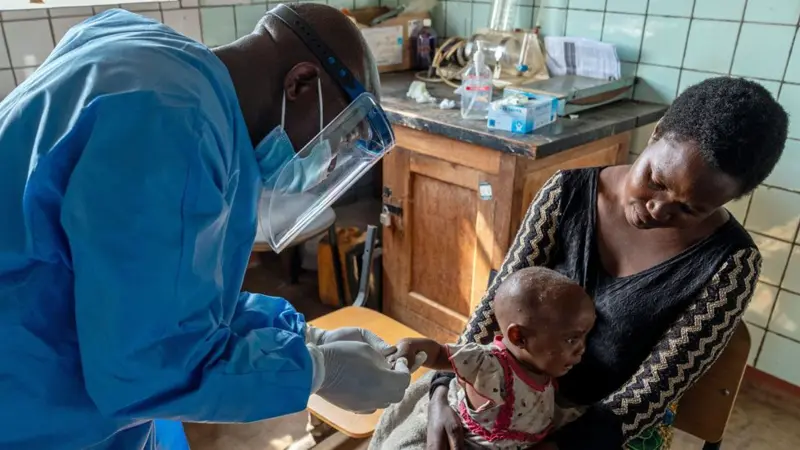
In recent years, the global health community has been confronted with various outbreaks of infectious diseases, with many posing severe risks to public health and the economy. However, one epidemic that has gained significant attention is the resurgence of Mpox (formerly known as Monkeypox) in several regions worldwide. Particularly in Kinshasa, the capital of the Democratic Republic of the Congo (DRC), the Mpox vaccination has played a pivotal role in preventing the spread of the virus and saving countless lives.
Mpox is a viral disease that typically occurs in Central and West Africa. It is caused by the Mpox virus, a member of the same family as smallpox, though its symptoms are generally milder. Mpox is characterized by fever, rash, and swollen lymph nodes. In severe cases, the disease can lead to complications such as pneumonia, encephalitis (brain inflammation), and even death.
Although Mpox is a zoonotic disease (transferred from animals to humans), it can also be transmitted from person to person through close contact with infected bodily fluids, respiratory droplets, or contaminated surfaces. As the world battles various infectious diseases, Mpox became a public health concern as it has been linked to the growing interaction between humans and wildlife habitats.
The DRC, particularly Kinshasa, has seen numerous Mpox outbreaks in recent years. The bustling capital, home to millions of residents, faces many challenges in controlling the spread of infectious diseases due to dense urban populations, limited healthcare infrastructure, and ongoing public health challenges. The DRC has also faced multiple epidemics of Ebola, malaria, and other infectious diseases, which complicates efforts to fight diseases like Mpox.
During an outbreak, healthcare professionals must work tirelessly to identify and isolate cases, contain the spread, and provide treatment. However, one of the most effective ways to prevent Mpox from spreading further is vaccination, and this is where the Mpox jab has proven to be an invaluable tool.
The introduction of the Mpox vaccine has had a transformative effect on public health efforts in Kinshasa. Health authorities in the DRC, with the help of international organizations like the World Health Organization (WHO), have launched large-scale vaccination campaigns to combat the virus and reduce transmission rates.
The Mpox jab is particularly effective when administered early, as it can prevent or significantly reduce the severity of the illness. For those who have already been exposed to the virus, the vaccine can still offer protection if given within a certain time window. Health officials in Kinshasa have focused on vaccinating healthcare workers, at-risk populations, and individuals who have been in close contact with infected persons. This targeted approach has helped curb outbreaks and avoid widespread transmission.
In Kinshasa, the vaccine has been a life-saver. The numbers tell a compelling story of success. In the months following the launch of the vaccination campaign, there was a significant decline in new Mpox cases, as well as a reduction in severe complications and deaths. The number of hospitalizations due to Mpox-related complications dropped, alleviating pressure on local healthcare systems and allowing them to focus on other urgent health needs.
Families who were once fearful of the disease have found new hope in the vaccine. Communities that once experienced devastating losses to Mpox now report fewer infections and greater peace of mind. In addition to the direct benefits of the vaccine, public health messaging and education have played a crucial role in ensuring that people understand the importance of getting vaccinated and the risks of ignoring preventive measures.
While the Mpox jab has proven effective in reducing the impact of the virus, there are still challenges ahead. Vaccine hesitancy remains a barrier in some areas, as misinformation and distrust of government health programs persist. Some individuals are reluctant to get vaccinated due to fears about vaccine safety, despite evidence supporting the jab’s efficacy and safety.
Another challenge is ensuring equitable access to the vaccine. Kinshasa, as a major urban center, has the infrastructure to deliver vaccines at a larger scale, but remote and rural areas may face difficulties in receiving timely and adequate vaccination doses. The government, along with international partners, must continue to prioritize vaccine distribution to these underserved areas to ensure that everyone is protected.
Additionally, surveillance systems need to be enhanced to monitor the long-term effectiveness of the vaccine and detect new outbreaks as they emerge. Ongoing education campaigns are critical to combating misinformation and ensuring that people understand the benefits of vaccination.
The success of the Mpox vaccine in Kinshasa offers a glimmer of hope for other regions in the DRC and beyond. As public health systems in Kinshasa continue to improve, the lessons learned from the Mpox response can be applied to combat other infectious diseases that may arise in the future.
Global partnerships, strong local leadership, and community engagement are all essential to the continued success of vaccination campaigns. The Mpox jab has proven that with the right tools, commitment, and coordination, it is possible to prevent outbreaks and save lives.
In the years to come, the residents of Kinshasa can look forward to a future where diseases like Mpox no longer pose a serious threat to their health. With the power of vaccination, lives are being saved, and the city is becoming a beacon of hope for other nations facing similar health challenges.
The Mpox vaccination campaign in Kinshasa has been a remarkable success story in global public health. By leveraging the power of the Mpox jab, lives have been saved, and the city has witnessed a reduction in infections, hospitalizations, and deaths. However, the fight against Mpox is not over, and it is essential to continue efforts to ensure widespread access to vaccines and education about their importance.
Through collective action and continued investment in public health infrastructure, Kinshasa and other affected regions can remain resilient against the threat of Mpox and other infectious diseases, proving that with the right tools, even the most daunting health crises can be overcome.

